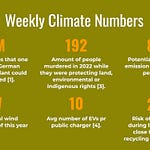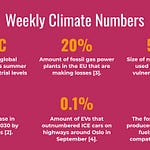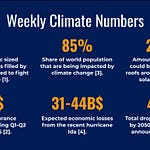Welcome to this weeks edition of The Weekly Climate 🎉
References: [1], [2], [3], [4], [5] and [6]
‼️News you can’t miss
Here’s one important scary/bad (🙀), good (😻), interesting (😼) and fossil (💩) news item.
🙀 Failing to meet Paris targets could ultimately lead to 59m sea level increase just from Antarctica ice melt (albeit in the next several hundred years).
😻 Tesla has decided to stop taking bitcoin for vehicle purchases citing environmental damage caused by bitcoin.
😼 A group of researchers are calling for net zero targets to split in two: One target dealing with actual emission reductions and the other dealing with negative emissions.
💩 A new study by the great Naomi Oreskes and Geoffrey Supran goes in great details about Exxon’s climate misinformation machine.
👩⚕️ Status: Climate & Science
Let’s look at how we’re doing this week!
[#sealevel] — A new study joins the choir of sea level rise reports from last week by concluding bluntly that if we don’t stay below 3 degrees C nothing will stop the ice in Antarctica from melting completely. This will lead to 59m sea level increase. This point of no return is expected to be reached around 2060. From 2100 and onwards we would see 0.5cm of sea level rise every year. This would mean a 5m sea level rise 2200 just from Antarctica melting. So it’s not happening fast, but clearly fast enough to warrant action.
[#spacejunk] — Are the problem with space junk (leftover dead satellites orbiting the Earth) and climate change connected? Why yes indeed. Here’s how: Usually space junk burns up in the upper atmosphere. But increased levels of CO2 is lowering the density of the upper atmosphere, which reduces the heating effect when stuff passes through the atmosphere. This is a problem because space junk that comes in contact with the upper atmosphere may now no longer burn up hence in the worst case scenario this effect could make the space junk problem 50x larger.
[#athens] — In this case study, The Guardian looks at Athens’ trouble with heat and how that problem will only get worse. It’s not rare that temperatures reach 40C in the Greek capital during the summer and according to the latest climate models those temperatures are expected to increase by a further 2C over the next 30 years.
[#archaeologists] — A group of 200 archaelogists are pushing climate scientists to improve their climate models. One reason for this is that they’re saying that many climate models today are superficial and doesn’t adequately model whether an area of land was altered by humans or not. The group has created the first archaelogical climate database that among other things contains information about which areas were developed by humans.
📰 The 7 Grand Challenges
⚡️Decarbonize Electricity
Clean electricity is the one do-or-die challenge we must solve.
[#renewable] — For a brief time last month California generated 95% of it’s electricity from renewable energy. Very nice!
[#renewable] — And more good news on the renewable front. 6 months ago the IEA published a report that forecasted growth for wind and solar. Now it updates the forecast by another 25% of growth in solar and wind. When it forecasted the growth of wind and solar for this year last year, it is now forecasting 40% more than that old estimate.
🏘 Reduce impact of urban and rural areas
Lowering the impact of urban and rural areas.
[#adaptation] — A new study has found that while 90% the 800 cities studied will face serious risks from climate change 25% of all cities can’t afford protection from these risks. Furthermore 43% of those don’t have any plans at all for how to adapt to these. 🎧 The Interchange podcast this week also look at climate resilient cities.
[#trash] — Here’s a question to Grist’s Umbra mailbox that gives some tips about how to get your neighbors to recycle more. Great input in an important debate.
[#repairability] — The French recently introduced a ranking of all big tech’s hardware devices in terms of repairability and now a US agency is looking into the same. People need to have a right to repair their devices. There’s a lot of counter arguments to that and a lot of counter arguments to the counter arguments. This article provides a good overview.
[#recycling] — In a new report a group of experts calls for mandatory recycling of all products containing rare earth minerals such as lithium, cobalt, indium and more. Right now there are no requirements to recycle equipment containing these materals but this needs to change. Remember from the last newsletter that lithium demand (which is being mined with child labor) is expected to increase by 42x by 2040.
🛁 Clean non-electrifiable activities
Some activities we do today can’t be electrified, these must be cleaned some other way.
[#aviation] — A company developing all-electric airplanes is getting one step closer to realizing that dream after taking delivery of it’s first electric propulsion units. After many test flights with it’s first airplane — an 9-passenger one — the time has now come to add an electric propulsion system.
🌳 Protect and grow nature
Nature is our ally, we must protect it and help it help us.
[#forests] — We hear a lot about deforestation, but here are some good news (at least a positive angle on a story 😬). A new study has found that forest area the size of France has regrown since 2000. This area is able to sequester approximately 5.9Gt of CO2. However, although this is a large area it is important to note that global forest area is still shrinking so this also says something about the massive deforestation that is occurring the fact that an area the size of France is not enough to keep up.
🍽 Optimize food
Without the lower impact of food or drink the hero doesn’t work (modified old danish proverb).
[#soil] — Here’s a great discussion of that “infrastructure” should also entail the ground beneath our feet. The reason: Healthy soil is an excellent protector against flooding. It’s not so great then that traditional agriculture does everything they can to make sure all our top soil disappears and the fact that our politicians just let them keep on doing it.
[#bigmeat] — Big oil copied big tobacco’s strategies to stay alive and now big meat is copying big oil in how it is fighting climate action. This article looks at the different strategies and compares them.
[#wine] — Climate change is shifting the production of food around. On the luxury side, the state of Michigan may be the next great wine hub as rising temperatures makes it possible even attractive to grow wine in this area.
⚖️ Climate Justice
Without justice there’s no future.
[#vulnerablecities] — All top 99 cities that are most vulnerable to environmental hazards (included in this definition are climate change related, air pollution etc) are in Asia. 80% are in India or China. The rest is spread out over Asia. Indonesia’s capital Jakarta is number 1.
⬇️ Engineered drawdown and geoengineering
Protecting our planet and species one way or another
[#carboncapture] — A big carbon capture project has been greenlighted in the Netherlands. The port of Rotterdam is responsible for 14% of the Netherlands carbon emissions. And now a big carbon capture project will capture emissions from a range of refineries located there and pump the CO2 under the ground. Tax payers in the Netherlands are footing the 2.6B$ bill to keep on burning fossil fuels in the form of a government subsidy. I’m not sure this is a good news.
📦 Other / catch-all
All the other stuff that I couldn’t fit into any of the other categories, than the other category.
[#opera] — It has been a tough year in general for the music industry due to COVID. But that doesn’t stop some from acting on climate change. The La Scala opera house in Milan has shaved off 630tons of their annual carbon emissions since 2010 and are now taking one step further by adding solar on their roof.
[#health] — Here’s a comprehensive look at how hospitals in the US (and around the world, but it focusses on US) needs to change and adapt to climate change. Not only is climate change making it harder for hospitals to serve their communities, but hospitals also create tremendous amounts of waste that could be made a lot more sustainable.
⭐️Special Topics
🎩 Global and local policy
We have a special interest in covering the major global and local policies regarding climate, whether good or bad.
[#netzero] — The debate about net zero is a heated one nowadays (see the past two newsletters for instance). And now a group of 300 experts are calling for governments to split net zero targets into two. A carbon emission reduction one and one focussing on negative emissions (such as carbon removal via direct air capture and similar). This will make it much clearer what we’re actually achieving. And right now net zero targets rely on unattainable high amounts of carbon removal.
[#canada] — If you don’t believe that fossil fuel lobbyism is alive and kicking then look no further than this article. The Canadian Climate Law Initiative have selected 26 climate champions to do their best to make COP26 the climate victory we need. And guess who got selected: None other than an executive from an oil company who’s wrecking havoc with Canada’s tar sands.
[#eu] — A new plan by the EU to limit pollution in cities is being welcomed but is lacking details on exactly how to bring down the pollution. Goals are great but needs implementation and execution.
[#us] — Following a four year Trump break the EPA has now updated it’s data on climate change’s impact on Americans and the conclusion: Everyone no matter where you live in the US are being impacted by climate change one way or another.
[#australia] — A UK expert says that Australia stands completely alone among it’s country peers in not having a climate plan. It’s expected that Australia will be put under heavy pressure to develop one during the G7 meeting next month.
⛽️Major Carbon Emitters
We have a special interest in covering the moving of the major carbon emitters as these are the key roadblock to climate action.
[#propaganda] — A new report by Harvard researchers Naomi Oreskes and Geoffrey Supran goes into great detail about how Exxon has used propaganda and PR to blame the entire climate crisis on all of us. This article has all the details.
[#jpmorgan] — The biggest fossil fuel financier in the world JPMorgan Chase releases it’s 2030 climate targets. Which is being ripped to shreds by the Rainforest Action Network (the authors of the annual Banking on Climate Change reports) who highlights that JPMorgan Chase funds 59 out of 75 of the fossil fuel companies that are expanding the most in terms of production and provides a total of 317B$ in lending and underwriting of fossil fuel assets.
[#bitcoin] — And now some great news. Tesla has decided to stop taking bitcoin for vehicle purchases due to the environmental harm that bitcoin and other proof-of-work (PoW) blockchains are causing our planet. I must admit that I was positively surprised by this! See Elon Musks tweet and Tesla’s statement about it in the tweet below. Also this article features an interview with a researcher who is tracking the carbon footprint of bitcoin where they discuss that it would make no sense to take bitcoin (or any PoW crypto) even if PoW blockchains switched to renewable energy.
[#facebook] — A new report highlights that there’s “overwhelming evidence” that Facebook is failing to tackle climate misinformation spreading on the platform. The report argues that although Facebook claims to be net zero in it’s operations the fact that climate misinformation are being spread so much on Facebook should probably be counted on the bad side of it’s carbon footprint.
[#heartattacks] — A new study links fracking (the method used to get fossil gas out of shale rock formations) to heart attacks. The study concludes that middle aged males that lived in Pennsylvania close to fracking sites had a 5% higher risk of heart attacks and also found a general increase in heart related hospitalizations.
[#banks] — Don’t be fooled — investment bankers still love the fossil fuel companies. On average 40% of investment banks revenue came from fossil fuel investments.
[#media] — Here’s a detailed look at how Exxon Mobil and other parts of big oil have influenced US media at least since the 80s. The piece argues for how this work influence the medias editorial decisions.
[#shell] — Here’s a great in-depth look at what Shell is doing to help us solve the climate crisis. Here’s a full list: Expand fossil gas extraction, keep producing fossil fuels and invest in carbon capture. 🤬
That’s it for this week folks! Remember if you’re feeling down, angry or sad from some of the news in this newsletter one cure is to act. And one way you can always act that also happens to be one of the most powerful things you can do is to talk about it. That also works if what you just read made you hopeful or happy btw.
If you enjoyed this newsletter don’t forget to share it with your friends, coworkers or other people you think could benefit from getting it. If you got directed here by a friend or another link on the Internet don’t forget to subscribe!
See you all next week 👋

















Share this post